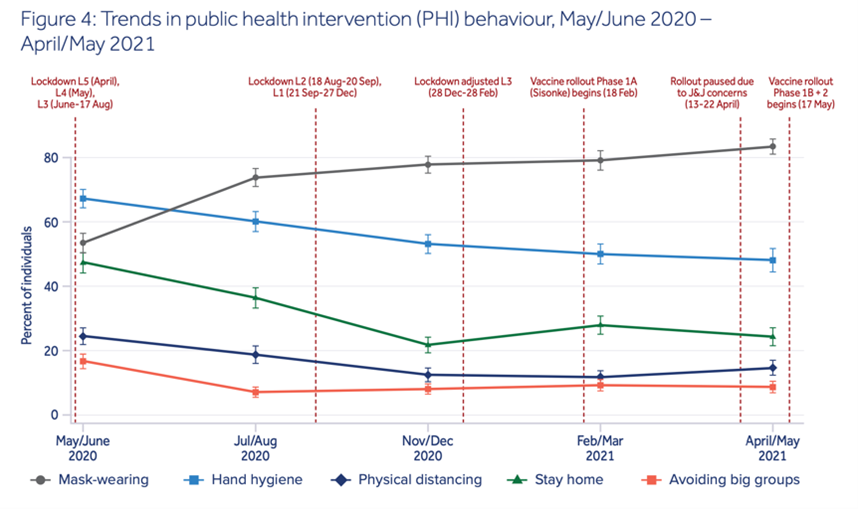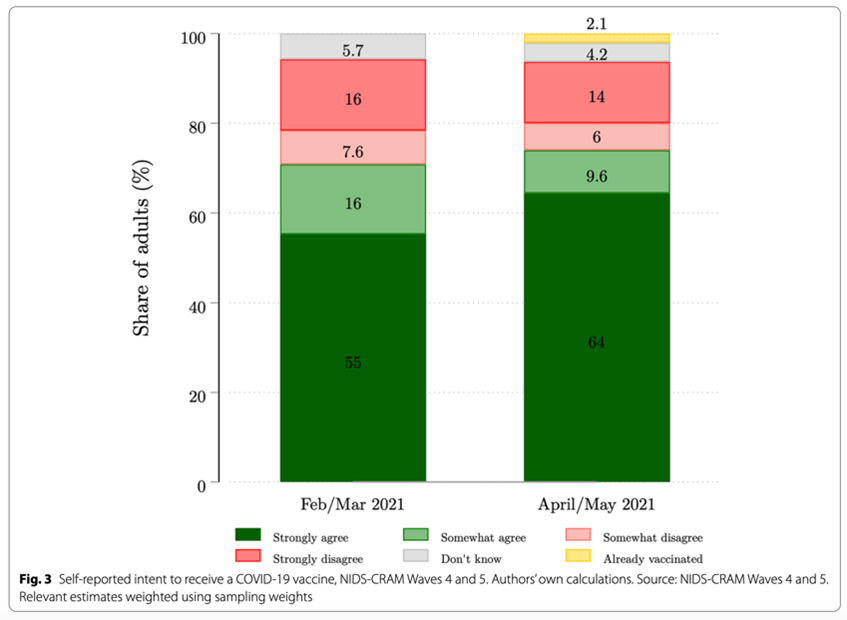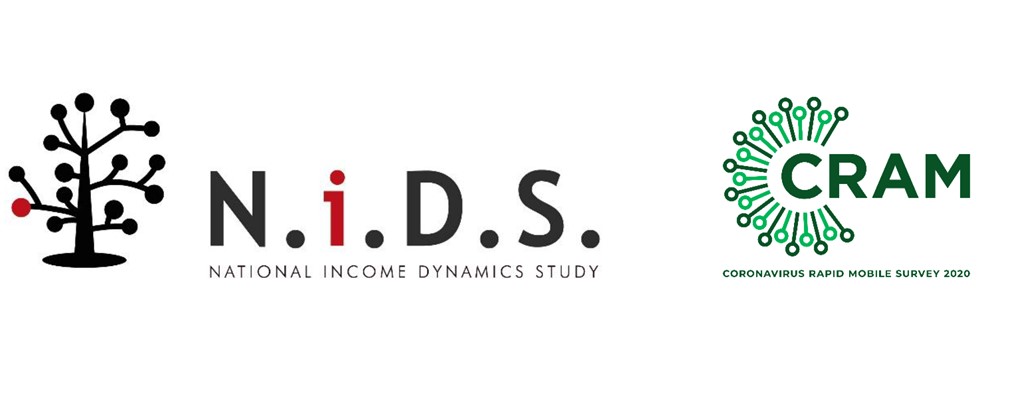The DPRU has been deeply involved in a wide variety of research projects aiming to provide empirical evidence on key socioeconomic outcomes during the COVID-19 pandemic and national lockdown in South Africa, specifically with respect to the labour market, workplace transmission risk, and social assistance.
Researchers at the Unit have been involved in a number of interesting projects:
- UNU-WIDER TERS: Commissioned by UNU-WIDER, this research looks at the causal effects of South Africa’s COVID-19 Temporary Employee/Employer Relief Scheme (TERS) policy on job retention. In other words, did the TERS save jobs? "The effect of wage subsidies on job retention in a developing country: Evidence from South Africa" is published as WIDER Working Paper 2023/114, authored by Köhler, T., Bhorat, H. and Hill, R.
- AFD-Presidency-EU Covid grant project: Jointly commissioned by the Agence Française de Développement (AFD), the South African Presidency, and the European Union, this research seeks to estimate and analyse the causal effects of South Africa’s COVID-19 grant – targeted to the unemployed who have little to no other source of income – on labour market outcomes. The paper seeks to uncover whether social protection policy can be used to not only provide relief to vulnerable households but also serve as an important source of economic recovery. "Can Cash Transfers to the Unemployed Support Economic Activity? Evidence from South Africa" is published as an Agence française de développement (AFD) Research Paper no 278, March 2023. ISSN : 2492 - 2846, authored by Köhler, T., Bhorat, H., and de Villiers, D.
- SAHR 2021 publication: On 22 April 2022, the Health Systems Trust launched the 2021 edition of the South African Health Review, an accredited peer-reviewed journal of critical analysis and commentary by specialists on key issues relating to health systems policy and practice. The 2021 edition considers the government’s and broader health sector’s response to COVID-19. As part of the NIDS-CRAM Wave 5 project, the DPRU's Tim Köhler along with co-authors from UWC and SU analysed changes in attitudes and adherence between May/June 2020 and April/May 2021 using longitudinal individual-level data from a nationally representative survey conducted during the COVID-19 pandemic.

-
Longitudinal changes in COVID-19 vaccination intent among South African adults: evidence from the NIDS-CRAM panel survey, February to May 2021: This recent journal publication in BMC Public Health by Tim Köhler and co-authors from UCT, SE, and U Penn., as part of the NIDS-CRAM Wave 5 project, examined longitudinal changes in COVID-19 vaccination intent among South African adults, as well as determinants of intent to receive a vaccine.

In 2020 we sought to offer a set of early impressions on the potential economic impact of the national lockdown and COVID-19 crisis, publishing DPRU working papers, NIDS-CRAM working papers, policy briefs, and multiple articles (Op-eds/blogs). Additional outputs include a book chapter contributed to “South Africa Beyond Covid-19: Trends, change and recovery” published by Jonathan Ball Publishers; a collaboration with researchers from Wits University, and a COVID-19 Country Report commissioned by the DPME and NRF. In 2021, another paper estimating the employment effects of that national lockdown was published in May.
Prof Haroon Bhorat, DPRU Director, has participated in multiple national and international seminar/webinars, interviews, panels and debates on this topic. He was also was also involved as a co-author in additional research projects related to outcomes during the pandemic: a DPRU policy brief which used administrative data from National Treasury to analyse expenditure and coverage dynamics of the COVID-19 SRD grant, a collaboration with researchers from Wits University to examine detailed labour market effects of the lockdown, and a COVID-19 Country Report on the implementation of measures to combat the effects of the pandemic commissioned by the DPME and NRF.
- Jobs and COVID-19: Measuring Work-related Physical Interaction: The latter component of our initial research served as an extension of another paper, which introduced the construction of an index of the level of physical interaction across occupations. Given the role of physical human proximity and contact in the spread of COVID-19, we built an index measuring the level of physical interaction for different occupations. This Physical Interaction Index provided some empirical evidence of one dimension of transmission risk that could inform how to calibrate the composition of economic sectors being phased back to work during the course of the national lockdown. We also provided some initial descriptive results for the South African labour market. See WP202003.
- Economics of COVID-19 in South Africa: Early Impressions: This paper assessed the monetary and fiscal responses to the crisis, detailing the various relief measures, and the implications for the fiscus. South Africa’s efforts to contain the Covid-19 pandemic were relatively rapid and comprehensive by international standards. In this paper we brought together a set of early impressions on the economics of the pandemic in South Africa, focused on several areas that are of key concern. Using the latest available data to examine the South African government’s relatively rapid and comprehensive economic response to the pandemic, we assessed both the potential economic impact of the pandemic, and presented an analytical instrument that can be used to guide thinking about the length and intensity of lockdowns in South Africa. The report also examined the potential economic impact of the pandemic and national lockdown, the monetary and fiscal responses, the various social relief measures, the implications for the fiscus, and also presented a quantitative, analytical index that can be used to guide thinking about the length and intensity of lockdowns based on variation in the risk of workplace physical interaction across industries. See WP202004 & PB20/54.
- Social Assistance Amidst the COVID-19 Epidemic in South Africa: An Impact Assessment: Furthermore, in July 2020 we used nationally representative survey data to examine the distribution and poverty effects of South African government’s chosen social assistance package of grant top-ups and the temporary COVID-19 Social Relief of Distress (SRD) grant, in comparison to alternative policy suggestions. We assessed the chosen cash transfer package, and found that the addition of the Covid grant may potentially reach a much larger group of otherwise uncovered, vulnerable individuals. This paper emphasises that social assistance from the South African government to mitigate the consequences of Covid-19 should not be viewed necessarily as a standard poverty reduction exercise, but rather as an attempt to mitigate Covid-related income shocks for the vulnerable who were most negatively affected by the pandemic. See WP202006 and Social Assistance Amidst the Covid-19 Epidemic in South Africa: A Policy Assessment (South African Journal of Economics 89: 63-81. First published: 04 January 2021).
- COVID-19 and the labour market: Estimating the employment effects of South Africa’s national lockdown: In this paper we seek to specifically isolate and provide causal evidence on the effect of South Africa’s lockdown policy - to do so, we adopt a quasi-experimental econometric technique to exploit variation in legislated industry-level permission to work and the coincidental timing of the lockdown and data collection dates of nationally representative labour force data. See WP 202107 and Wits School of Governance - SA Future Economy Working Paper, 26 April 2021.
- Wage subsidies and COVID-19: The distribution and dynamics of South Africa's TERS policy: Wage subsidy-based job retention policy has served as a dominant tool used to mitigate job losses in the context of COVID-19. In South Africa, such a policy served as a core component of the government’s policy response: the Temporary Employer-Employee Relief Scheme (TERS). We make use of longitudinal survey data to analyse aggregate and between-group TERS receipt during the pandemic as well as the relationship between receipt and job retention. We investigate the impact of the TERS using NIDS CRAM data, and find that it may well have succeeded in saving jobs at the start of hard lockdown in 2020. See WP202109.
National Income Dynamics Study – Coronavirus Rapid Mobile Survey (NIDS-CRAM)

Prof. Bhorat and a number of the DPRU’s researchers engaged in the analysis of timely representative survey data collected during South Africa’s national lockdown, alongside a national consortium of 30 social science researchers from five South African universities. The National Income Dynamics Study – Coronavirus Rapid Mobile Survey (NIDS-CRAM) included policy-relevant data on key outcomes such as grant receipt, labour market outcomes, household welfare, and knowledge of COVID-19.
Policy papers and a policy brief were produced, alongside several subsequent presentations to stakeholders and media Op-Eds:
- COVID-19, social protection, and the labour market in South Africa: Are social grants being targeted at the most vulnerable? Here we aimed to use the newly available (i.e. in August 2020) Wave 1 of the NIDS-CRAM to provide a quantitative, descriptive evaluation of whether social grants are being successfully targeted at the most vulnerable, in the context of the national lockdown and COVID-19 crisis in South Africa. The data showed that the adverse labour market effects of the pandemic have been disproportionately borne by individuals in lower-income households. Considering the observed heterogeneity in labour market outcomes before and during lockdown across the household income distribution and that grants are relatively well-targeted; we concluded with a set of policy recommendations for South Africa’s social protection system going forward. NIDS-CRAM Wave 1 Working Paper 2020/06, July 2020.
- Social assistance during South Africa’s national lockdown: Examining the COVID-19 grant, changes to the Child Support Grant, and post-October policy options. We then used Wave 2 to provide a three-part analysis of: i) the distribution of application for, and receipt of, the special COVID-19 SRD grant; (ii) how the Child Support Grant ‘per grant’ top-up in May compared to the ‘per caregiver’ top-up in place from June 2020 onwards, and (iii) the costs and welfare effects of several alternative policy options to consider once the expansion of the grants system came to an end after October. We gave specific focus to the distribution of the government’s special COVID-19 SRD grant, providing first-time evidence of its extensive, pro-poor nature. NIDS-CRAM Wave 2 Working Paper 2020/09, September 2020, and Daily Maverick Op-Ed The new Covid-19 Social Relief of Distress grant: Understanding who it reached, 30 September 2020.
- Mind the Gap: Analysing the effects of South Africa’s national lockdown on gender wage inequality: This paper investigates this hypothesis by using representative survey data collected prior to and during the lockdown to construct comparable estimates of the evolution of the unconditional and conditional gender wage gaps. Given the evidence of heterogeneity across the earnings distribution (Mosomi, 2018), we also estimate the gender wage gap across the entire distribution of earners both before and during the lockdown, while accounting for selection into labour market participation, and make use of new information collected in Wave 2. NIDS-CRAM Wave 2 Working Paper 2020/07, September 2020, and Daily Maverick Op-Ed Women’s wage woes during the Covid-19 lockdown, 30 September 2020.
- The distribution and dynamics of South Africa’s TERS policy: Results from NIDS-CRAM Waves 1 to 5: Wage subsidy-based job retention policy has served as a dominant tool used to mitigate job losses in the context of COVID-19. In South Africa, such a policy served as a core component of the government’s policy response: the Temporary Employer-Employee Relief Scheme (TERS). We make use of longitudinal survey data to analyse aggregate and between-group TERS receipt during the pandemic as well as the relationship between receipt and job retention. NIDS-CRAM Wave 5 Working Paper 2021/07, July 2021; and Daily Maverick Op-ED Labour market: Ters payment period should be extended if job losses are to be minimised, 8 July 2021.
Additional papers featuring DPRU researchers Tim KoÌhler and Rob Hill:
- Maughan-Brown, B., KoÌhler, T., Burger, R., Rossouw, L., Christian, C. and English, R. (2021). COVID-19 risk perceptions, preventive behaviour and COVID-fatigue during a lull in the epidemic in South Africa. National Income Dynamics Study Coronavirus Rapid Mobile Survey (NIDS-CRAM) Working Paper, Wave 3(6), 17 February 2021.
- Van Walbeek, C., Hill, R., Filby, S., van der Zee, K. 2021. Market impact of the COVID-19 national cigarette sales ban in South Africa. National Income Dynamics Study Coronavirus Rapid Mobile Survey (NIDS-CRAM) Working Paper, Wave 3(11), 17 February 2021.
- Burger, R., Maughan-Brown, B., Köhler, T., English, R. and Tameris, M. (2021). A shot in the arm for South Africa – increased openness to accepting a COVID-19 vaccine: Evidence from NIDS-CRAM Waves 4 and 5. National Income Dynamics Study Coronavirus Rapid Mobile Survey (NIDS-CRAM) Working Paper, Wave 5(2), 8 July 2021.
"Legal Challenges To The Institutional And Regulatory Framework, Human Rights Violations and The Conduct Of Law Enforcement Agencies"
Prof Haroon Bhorat was the lead for this chapter, in a collaboration between 12 researchers across nine universities and institutions, including UCT, WITS, SU, UNISA, UKZN, University of Limpopo, the HSRC and the Water Research Commission, which formed part of an NRF- and GTAC-led country report on the measures implemented to combat the impact of COVID-19 in South Africa.
The Covid-19 Country Report for South Africa
This work was commissioned by the late Minister Jackson Mthembu, the Minister in the Presidency, with the aim to record measures and interventions adopted by government in partnership with social partners to manage, respond to and combat the spread of Covid-19, as well as its socio-economic impacts. It is jointly implemented by the NRF, the Government Technical Advisory Centre (GTAC), and the Department of Planning Monitoring and Evaluation (DPME). Prof. Haroon Bhorat, Benjamin Stanwix, and Tim Köhler at the DPRU contributed to Chapter 5 of the report documenting and analysing the expansion of social protection in response to the pandemic, drawing on representative survey data, administrative data, and existing research. The 1st edition was finalised and published in the public domain in 2021, and the 2nd edition is expected to be published in 2022.
